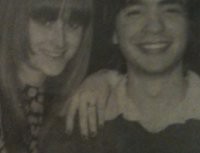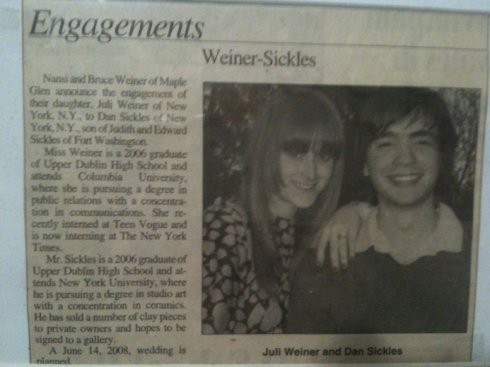Vampire-Based Entertainment
by Walt Fruttinger

From time to time, particularly when it is taking off for the rest of the day, The Awl offers its space to normal, everyday people with a perspective on national issues. Today, we’re pleased to once again present you with Walt Fruttinger, an Applebee’s franchisee who at this time has some thoughts about the kids today.
If you lick your index finger and hold it up to the winds of pop culture at the moment, you’re going to find a strong current of vampire blowing your way. Fanged creatures are all over the place right now, and most of them are “teenaged” creatures who are “hot” aimed at hordes of teenagers who are not. So, what do they have in common? Both groups are sullen and brooding. Only the thing is, the vampire ones are what every teenager wants to be: dangerous. And, as previously stated, the vampire ones are also much more attractive than, uh, the real thing.
My question is this: is being a normal teenager right now so goddamn tough that you need to rely on delving into a world of some fictional, fantastical, blood-drinking powers to assuage or come to terms with the shitpile that your real life is? I hope not. Now, I understand that puberty is a multi-tentacled typhoon, sprinkling a hail of zits on your face, while leaving behind a wake of stray, unwarranted boners in your shorts, and awkward social situations that make you want to vomit and kill someone(s). You have some responsibility, no power and very little money. If you’re a girl, you want to be feminine, but you don’t want every mouthbreathing clod to glom onto you, giving indelicate squeezes to your emerging boobs and asking if you’re turned on. And if you’re a boy, you spend 14 hours a day trying to get a gym sock pregnant. School sucks. No one understands anything about you, and your parents are either drunks or squares.
Still.
When I was a teenager, there weren’t vampires (unless you count Lost Boys and that was a Corey-laden bag of crap), and there wasn’t texting, and there were not blogs and digital armies of friends ready to champion or bully your feeble ideas and jokes. If we wanted to revert to a fantasy world, there was a hill we climbed, a bonfire we lit, blackberry brandy we drank, and lots of ditchweed to smoke. There’s nothing like the isolated bubbling of water emanating from a three-foot bong, as smoke collects in its chamber, with your thumb on the carb and your other hand ready to yank the stem, knowing that very soon every single problem in your life will disappear, and your only care in the universe will be pursuing a still-warm bag of caramel corn from the stand at the mall. Now that’s magic! And no one needed to be bitten. All the of the answers to life’s mysteries resided in the Faces of Death video series and also in Black Sabbath records. Even some of the lyrics of Dennis DeYoung of STYX.
Here’s another thing. I was called “ButtFrutt” for most of my tenure in high school. So I know something about being an ostracized loser. I wrestled in the heavyweight class and someone soiled my uniform with a melted Zagnut candy bar in the crotch on a road trip. They put the chocolate bar right in the taint of the suit, and then put my gymbag on one of the bus’s heaters.
“Here, Walt. Your tights will be warm for the match.”
“Thanks, friend.”
So, upon its discovery, I was given Gregg Curtis’s 144-lb-class unitard, after he had hexed it, by losing his match (he was fond of holding up both of his hands and wincing in the direction of his opponent once the ref got things under way), and it was dripping with sweat, and me being 175-lb, and a bit too big for it, I promptly split the “ass” of the suit wide open when I went for a Greco hammerlock on my opponent. The scorekeeper was drinking a Rondo pop at the time and all I remember was seeing it shoot in long arcs from his nostrils. It was a terrible bus ride back to Bozeman, and not because I had to forfeit my match. Thank God there were no digital cameras or Facebook photo journals to capture the humiliation, although I was not 18 and so whomever posted an image like that could have been subject to child porn laws and I might have made a killing in a lawsuit. Fruttinger v. Board of Ed or something.
My point is, did I get home, cry, and then race out and see a vampire movie? Or bury myself in some book about some fangy fuckers exacting some revenge for the existential pain experienced by getting hair on their privates? No. I took a giant pinch of Skoal chewing tobacco, pleasured myself, did four swatters of some ganja that a friend’s older brother had procured in Boulder, and then rode my ten speed over the arcade and put my quarters up on the Dig Dug machine and waited for someone to tell me where the keg party was.
It was along wait, because I didn’t have many friends, and the ones I did spread the ButtFrutt story like wildfire. And social gatherings consisted of people mooning me, or re-enacting my wrestling match, and kids from other schools drawing obscene pictures on bed sheets and holding them up at future wrestling matches. But still. I didn’t need a really intense vampire story. Kids were more into dragons then, I guess. And since there weren’t real fire-breathing dragons, of course, I quietly took it upon myself to capture a little bit of their power, when I later burned down a dozen horse barns in the area. And also a grocery store. And a florist’s shop. But a lot of that is ’cause I was on drugs and listening to heavy metal. But I felt better. Don’t you see my point? I wasn’t some moody little fucker.
Previously: Health Care for Everyone
Death Of Uncool

Now that everything is available to all of us at any time, does that mean that the concept of “uncool” is over? Brian Eno thinks that it does, which may bode well for unjustly neglected masterpieces of adequacy such as Peter Wolf’s 1987 release Come As You Are. There’s hope for all of us!
The Prank Review, with Juli Weiner: An Introduction
by Juli Weiner

From time to time, Juli Weiner will review pranks and their aftermaths. We begin, as all good things should, with an introduction.
My sophomore year of college, winter break was thirty-one days long. The first part of the break I went on a trip, but from the end of December to the end-of-the-middle of January, I had exactly zero plans, goals or tasks for my time in suburban Philadelphia. While I was on vacation, my friends Dan and Asa returned from their own schools. By the time I got back, they had both already received citations for public urination. They too were very bored. We realized though that their arrests would probably have made the police blotter in the local paper, the Ambler Gazette. Eventually, we found a copy of the paper in my parents’ recycling bin. Our scheme was to cut out the blurb, sneak into our high school, and tack it on the bulletin board reserved for clippings of alums and students in the news. The point being, our graduating class had been, to date, extravagantly undistinguished. The only students and alums ever “in the news” were the ones who sent in their wedding announcements. Which, come to think of it, would be a much funnier thing to have in the paper or on the bulletin board than a citation for public urination.
We decided that it would be Dan and I who would pretend to be engaged. We figured the thing would have a better shot of getting published if it were a straight wedding, and the paper wouldn’t be basically required to accept Dan and Asa’s gay engagement announcement because to reject it would be a hate crime. We went to the Gazette’s website and filled out some form that asked for our schools, ages, parents’ names. We weren’t able to come to a consensus about whether it would be funnier to supply actual facts or realistic-seeming lies, so we just put down both. “His education: Graduated from Upper Dublin High School in 2006, will receive a B.F.A. in studio art with a concentration in ceramics from New York University in 2010.” (True, false, false, true!) For “his employment (company, location and title or position)” we put: “He had sold a number of clay pieces in New York City to private buyers and is hoping to one day be signed to a gallery.” (False, false, false!) For the photo, Asa’s mom volunteered to let me wear her wedding ring and let Dan borrow her hairbrush.
Away we sent it. Our expectations were low, due to this stern policy:
Montgomery Newspapers reserves the right to edit announcements according to our style. All announcements will be confirmed by phone. Please expect our call. Thank you.
Well, this was the most outlandish lie on the entire form. No one called anyone to confirm anything, or even wrote back to let us know that they received our materials.
And so two weeks later, it appeared.
We did not anticipate a number of things: one, the comical effect of the juxtaposition of our fake engagement announcement next to some couple’s actual wedding announcement-”no but like… those people are like actually getting married!”-and two, the demographics and size of a smalltown weekly paper’s readership.
I received a flurry of Facebook friend requests over the course of that week. (Apparently, you become more friend-worthy when you are engaged.) I eventually changed my default photo to the the words “NO, WE’RE NOT. IT’S A JOKE.”
The afternoon the paper was delivered, people that my parents had not spoken to in years called to offer their curious congratulations. My mom had to explain to her friends, their friends, the parents of my friends, and some of my friends-who were too nervous to ask me, in case it turned out to be true-that I was not pregnant. Some nurses at the hospital where my dad worked chipped in and bought him a gift basket and flowers and taped cards to his locker in the operating room. Another of his colleagues told him that she was excited that “our daughters are getting married the same day.”
My parents weren’t even that mad, really, they just forbid us all from carrying out what we decided would be part two of The Plan: to try to submit a wedding announcement every week but with various combinations of me, Dan and Asa until someone at the Gazette finally noticed. And then we went back to college.

Juli Weiner is an editor at Wonkette.
Lego 'Matrix' Brings Us Closer To Day's End
Because it’s that kind of day, and because why not, and because, actually, it’s kind of awesome, here is the “Dodge this” scene from The Matrix recreated in the medium of Lego. Did you know The Matrix is actually ten years old now? I bet if you turned on your TV right now you’d be able to find it playing somewhere. Anyway, enjoy. We’re getting there! [Via]
"In a properly functioning capitalist economy, rich people don't 'create jobs' for workers; workers...
“In a properly functioning capitalist economy, rich people don’t ‘create jobs’ for workers; workers, upon having jobs, create rich people.”

This is a fantastic read from Baltimore City Paper, on the “fact” that Maryland’s number of millionaires dropped to 4,910 in 2008 from 7,067 in 2007. It includes a basic primer on how business works, which is so delightful we must excerpt it here.
Critics of the millionaire tax say they’ve never heard of a poor man hiring a worker. Only the rich do that; therefore, to render the wealthy less so by taxation is to destroy jobs.
The theory presumes that the wealthy hire people out of charity. In this model, jobs are bestowed upon lucky workers by the industrious entrepreneur, who derives his own wealth from some magical practices (having nothing to do with the workers he may hire) which are anyway unfathomable to outsiders.
To hear self-proclaimed capitalists make this argument is irritating, because it suggests they don’t understand how our economic system is supposed to work. They have the process exactly backwards.
In a capitalist system, investors make money not despite hiring workers, but because they hire workers who, if they are adequately managed, create value in excess of the wages and benefits they are paid. This value is called “profit,” and the business’ owner gets to keep that, after paying taxes.
In a properly functioning capitalist economy, rich people don’t “create jobs” for workers; workers, upon having jobs, create rich people.
That’s how the system works, in theory.
But the reality is different from the theory. In today’s marketplace, the super-rich have become richer in large part by destroying jobs.
Jesus Got Around
Your headline of the day, via the Mail:

Apparently both Jesus and Joseph of Arimathaea were totally pumped to see the Stone Roses’ comeback gig and were bitterly disappointed when the band pulled out. Doubters can take comfort in that fact that “there is nothing specific by way of archaeological finds; Jesus’s shoe has not turned up.”
Did You Already Mess Up Thanksgiving Week?
Doh, here’s some good advice about how to deal with this week that we forgot to give you yesterday. Sorry! Hope you figured it out! “Tuesday Night: Have sex with your spouse. Your family is getting in on Wednesday night and nobody is getting laid with in-laws in the other room. Unless you miss the kind of quiet and terrified sex you used to not do very much of in high school, Wednesday night is a non-starter. Sitting on your couch Thursday night while a small petting zoo rests in your stomach doesn’t make anybody feel sexy either. And it’s not going to get better over the weekend.”
The Future: When the Editors Hire the Publishers

At a bar last night, I was talking to someone smart who made an excellent point: that a very quiet, revolutionary act in the history of publishing had just taken place. (This person compared this moment to Gutenberg, which might be a little bit far afield but not that far off!) That is that Joshua Micah Marshall is hiring a publisher for Talking Points Memo, the blog he started all on his own in 2000, a bit before all the warbloggers like Jeff Jarvis and Glenn Reynolds came onto the Internet, and four years before Michelle Malkin. (Oh yes, how soon we forget.) My friend’s point was: here is an editor, who built and owns his publication, who is now going to be the editor-owner, who will employ the publisher. For those of you who have worked at any sort of publication, the implications of this are staggering.
This publisher will be responsible for making the publication hum and grow. The first duty in the listing is “audience growth.” This is what a publisher should do: ensure the ongoing financial success and growth of his or her publication. Instead, what we have now in the media industry are publishers who believe their duties include dictating the editorial mission on behalf of a business principle. This is when publishers go wrong and, generally, is when they should be taken out back and shot.
Except when the owner is the publisher, as is so often the case, she or he can never be dislodged, and rarely disobeyed. And even when the publisher isn’t the owner outright, the publisher still represents those interests. And worse: the hybrid corporation/owner.
For instance, pretty much everything that is wrong with the Washington Post is driven by issues of ownership and control; the financial operation of the newspaper exercising control over editorial. (In this case, as so often happens, the executive editor of that paper, Marcus Brauchli, has some sort of weird, terrible, degrading Stockholm Syndrome relationship with the publisher-owner-corporation as well, and it is destroying the paper.)
Now that anyone can own a publication just by sweat equity, what will happen when the publishers actually report to the editor-owners? Yes, I am pretty much expecting a grand utopia, and perhaps I will be disappointed. But it’s high time media publishing-where, nearly everywhere across the industry, the business side that has failed so utterly at its duties is currently squeezing every last bit of blood out of editorial-tried something different.
Baboons Now As Smart As Bears

Tourists in Cape Town, South Africa, are being victimized by a gang of baboons, who have “learned how to open car doors and jump through windows in pursuit of tasty sandwiches and snacks.”
On Tuesday, a troupe of 29 baboons raided four cars outside Simon’s Town, a small coastal neighborhood. A baboon dubbed “Fred,” the leader of the group, opened unlocked doors and jumped through windows to search for food.
He ransacked a bag in the back seat of a red car as a couple panicked about their passports. A girl screamed nearby as a baboon hopped into her car through a back window. Others climbed on car roofs and hoods, looking for ways inside.
Many of those who stopped to watch the raid had their own cars broken into by other baboons.
I guess it’s a good thing we’ve decided to let the planet go to hell; the animals were going to take over soon enough anyway.
Sketchy Coma Story Called Out For Improbabilities
I have had a ton of questions this week about Rom Houben, the Belgian man who was supposedly completely conscious during a 23-year coma. Like, “Really?” And, “How does that work?” And, “Doesn’t this sound a little unlikely?” Well, now that the world has reported the miracle and all of its amazingness, there are finally some other people who have questions. Like this guy.
Houben’s account of his ordeal, repeated in scores of news stories since appearing Saturday in Der Spiegel, appears to be delivered with assistance from an aide who helps guide his finger to letters on a flat computer keyboard. Called “facilitated communication,” that technique has been widely discredited, and is not considered scientifically valid.
“If facilitated communication is part of this, and it appears to be, then I don’t trust it,” said Arthur Caplan, director of the University of Pennsylvania’s Center for Bioethics. “I’m not saying the whole thing is a hoax, but somebody ought to be checking this in greater detail. Any time facilitated communication of any sort is involved, red flags fly.”
They sure do! Anything else, Arthur Caplan?
“You’re going to lie for 23 years in a hospital bed with almost no stimuli, and then sound completely coherent and cogent? Something is wrong with that picture. The messages are almost poetic. It sounds too lucid, like someone prepared these things to say. I’m not saying it’s all a fraud, but I want to hear a lot more.”
Me too!
